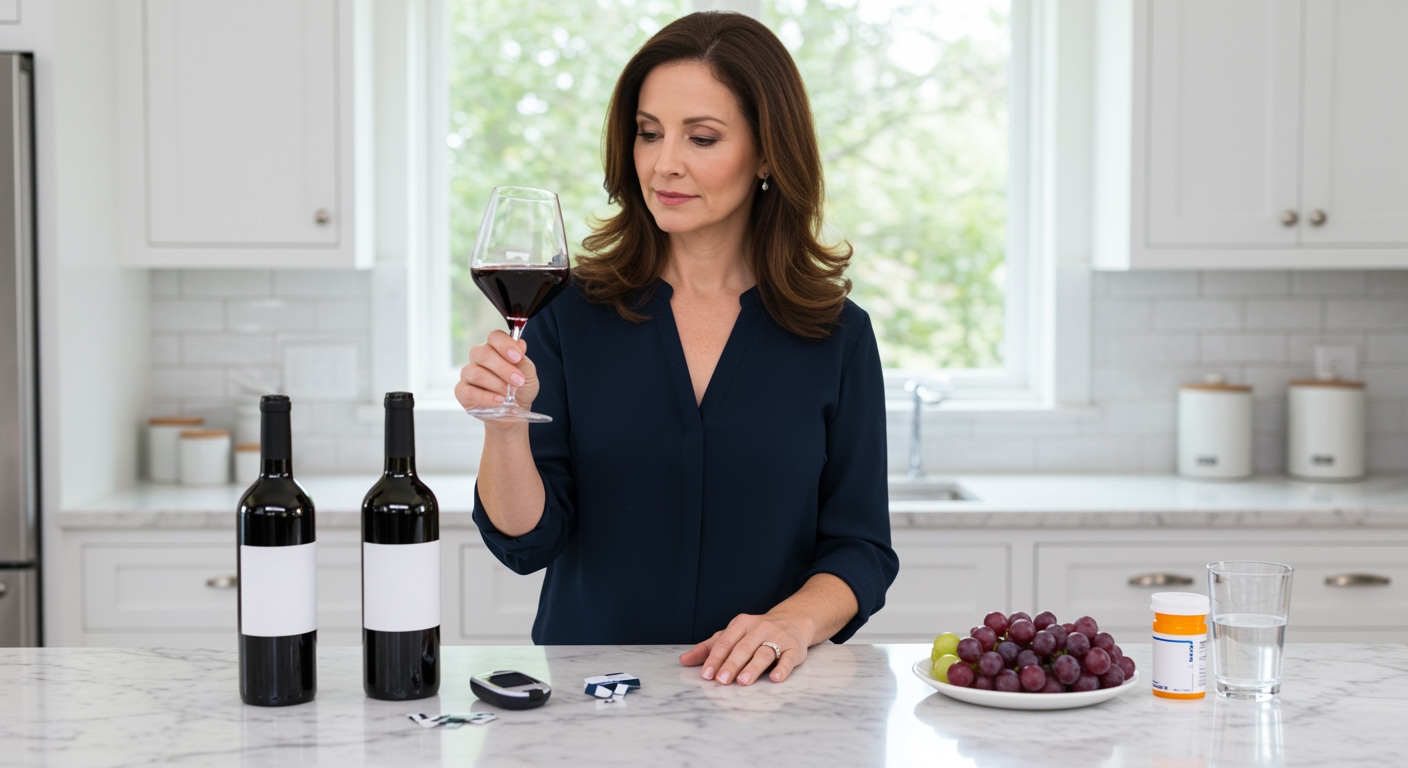✪ Key Takeaway: Red wine can lower blood sugar temporarily but may cause dangerous delayed drops, making moderation essential for diabetes management.
Introduction
You pour yourself a glass of red wine after dinner and wonder if you just made a mistake.
People with diabetes face this dilemma every day because conflicting information about alcohol and blood sugar creates confusion and anxiety.
Hi, I am Abdur, your nutrition coach and today I am going to explain exactly how red wine affects your blood sugar and whether it belongs in your diabetes management plan.
How Does Red Wine Affect Blood Sugar Levels?
Red wine creates a complex response in your body that differs from other alcoholic beverages.
When you drink red wine, the alcohol initially causes your liver to stop producing glucose.
This happens because your liver prioritizes breaking down alcohol over maintaining blood sugar levels.
The result is often a temporary drop in blood glucose that can last several hours after drinking.
Red wine also contains natural compounds called polyphenols that may improve insulin sensitivity.
Research shows these antioxidants can help your cells respond better to insulin, potentially lowering blood sugar levels.
However, this effect varies greatly between individuals and depends on factors like timing, food intake, and medication use.
✪ Pro Tip: Always check your blood sugar before and after drinking to understand your personal response pattern.
What Are The Risks Of Drinking Red Wine With Diabetes?
The biggest danger comes from delayed hypoglycemia that can occur hours after your last sip.
Your liver continues processing alcohol long after you finish drinking, which means glucose production stays suppressed.
This creates a dangerous window where your blood sugar can drop suddenly, especially during sleep.
People taking insulin or sulfonylurea medications face higher risks because these drugs also lower blood sugar.
The combination can create a perfect storm for severe hypoglycemia that requires emergency treatment.
Red wine also contains carbohydrates and calories that many people forget to account for in their meal planning.
A standard glass contains about 4 grams of carbs and 125 calories, which can disrupt your daily targets and contribute to weight gain over time.
✪ Fact: Alcohol-induced hypoglycemia can occur up to 24 hours after drinking, making monitoring crucial.
Are There Any Benefits Of Red Wine For Diabetes?
Some studies suggest moderate red wine consumption might offer cardiovascular benefits for people with diabetes.
The polyphenols in red wine, particularly resveratrol, show promise for improving heart health and reducing inflammation.
Research indicates these compounds may help protect against diabetic complications like heart disease and nerve damage.
Red wine consumption has also been linked to improved insulin sensitivity in some population studies.
However, these benefits only appear with very moderate consumption and disappear completely with excessive drinking.
The Mediterranean diet studies that show positive effects include red wine as part of a comprehensive healthy eating pattern.
This means the benefits likely come from the overall dietary approach rather than wine alone, making it impossible to isolate the alcohol effects.
✪ Note: You can get similar antioxidant benefits from grape juice without the blood sugar risks.
How Much Red Wine Is Safe For People With Diabetes?
The American Diabetes Association recommends no more than one drink per day for women and two for men.
One drink equals 5 ounces of wine, which is smaller than most restaurant pours and home servings.
Many people pour 8-10 ounces without realizing they are exceeding safe limits by nearly double.
Timing matters just as much as quantity when it comes to diabetes management.
Never drink on an empty stomach because food helps slow alcohol absorption and provides glucose to counteract potential drops.
The best approach is drinking with meals that contain complex carbohydrates and protein.
Always have a plan for monitoring your blood sugar more frequently on days when you choose to drink alcohol.
✪ Pro Tip: Use a measuring cup to pour wine until you can accurately eyeball a 5-ounce serving.
When Should You Avoid Red Wine Completely?
Certain medical conditions and medications make red wine completely off-limits for people with diabetes.
If you have diabetic neuropathy, alcohol can worsen nerve damage and increase pain over time.
People with liver disease or elevated liver enzymes should never consume alcohol because it accelerates organ damage.
High triglycerides, a common problem in diabetes, can spike dramatically with even moderate alcohol consumption.
If your diabetes is poorly controlled with frequent blood sugar swings, adding alcohol creates unnecessary complications.
Pregnancy, history of alcohol abuse, and certain medications like metronidazole create absolute contraindications to drinking.
Always discuss alcohol consumption with your healthcare provider before making it part of your routine, especially if you take multiple medications.
✪ Fact: Over 150 medications can interact dangerously with alcohol, making medical consultation essential.
The Bottom Line
Red wine can be part of diabetes management for some people, but it requires careful consideration of timing, quantity, and individual health factors.
Health is not about perfection, but about making informed choices that support your long-term wellbeing.
I would love to hear about your experiences with alcohol and blood sugar management, so please share your questions or thoughts in the comments below.
References
At NutritionCrown, we use quality and credible sources to ensure our content is accurate and trustworthy. Below are the sources referenced in creating this article:
- Healthline: Red Wine and Type 2 Diabetes
- Diabetes Journals: Red Wine and Diabetes Health
- PMC: Alcohol and Diabetes
- Medical News Today: Can Diabetics Drink Wine





